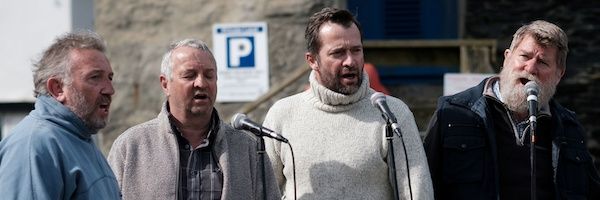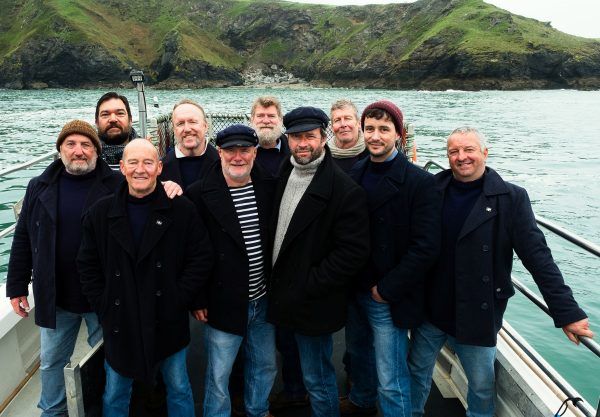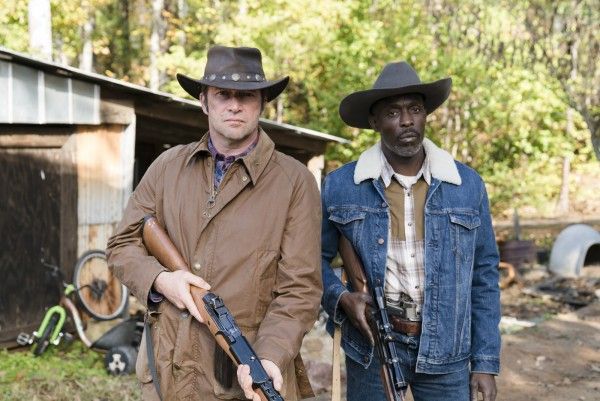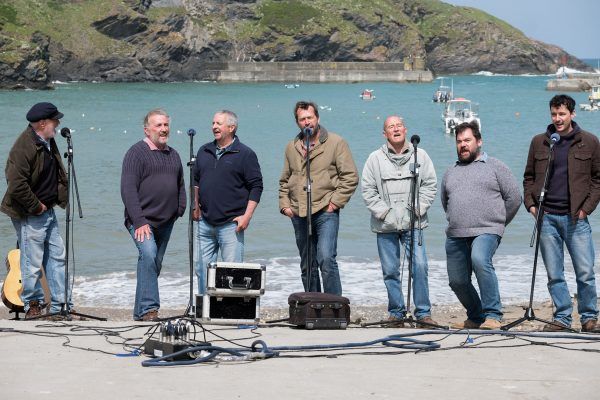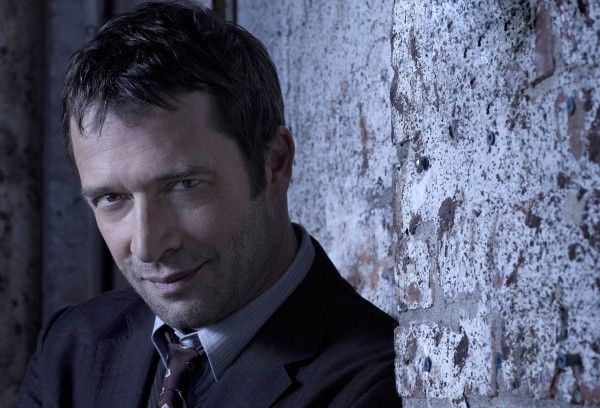Inspired by a true story, the heartwarming dramedy Fisherman’s Friends tells the tale of a group of men, made up of fishermen and lifeboat volunteers, who sing sea shanties in their small town in Cornwall, England. Taken by their performances, a music manager hears their potential and helps guide them on their path to success.
During this 1-on-1 phone interview with Collider, James Purefoy – who plays the group’s lead singer, Jim – talked about the task of learning to sing for the film, performing such soulful songs, why the shoot was a really good experience for everybody, and being endlessly surprised about the roles he gets asked to play. He also talked about how special Hap and Leonard is to him, the intense experience of making The Following, why he wanted to join Pennyworth Season 2, and the genre that he’d love to be able to work in.
Collider: Could you have ever imagined playing a character, at this point in your life, where you would be forming a band and singing these songs?
JAMES PUREFOY: No.
When this came your way, was that surprising?
PUREFOY: Yes, but then I’m an actor who is endlessly surprised about the parts that I get asked to do. It’s only ever when I’m truly terrified of something that I think it’s a good idea to do it. So, when it came to singing, I can sing so well in the shower that I could be standing center stage of the Royal Opera House. But once that water goes off and I’m out of the shower, there are lots of freaky sounds. To have to learn how to sing, and sing the songs in the movie, and really understand where they came from and the story behind all of them, that was just a treat. It was a real treat to do. As you get older, as an actor, you need to seek out new experiences all the time. Otherwise, you just go stale and you end up doing the same thing, over and over again. So that’s what I like doing. I like doing new and challenging things that I think I probably shouldn’t do, and then I end up doing. They never go too badly, especially if you’re very frightened.
Did you get to a point where you felt comfortable or confident in singing these songs?
PUREFOY: I actually found myself settling into them and really enjoying the emotion. There’s a lovely song that they see in the church called “Little Eyes.” It’s such a sweet song, and I loved hearing it. My daughter kept coming to the rehearsals because she was down with me, and then all I’d hear in the garden, that summer, was her [singing that song]. I’d hear this little trilling sound, and it filled my heart with gladness and satisfaction. We might be doing a sequel to the film, which will take place around the idea that Fisherman’s Friends ended up playing at the Glastonbury Festival, in front of a hundred thousand people, as the support act to Beyoncé. It was hilarious that that should happen. If I get my moments on the stage at Glastonbury, I think my life might be complete at that moment. We will go on and do one song at Glastonbury. I hope that I don’t bugger it up because we’ll get one take, and that will be it. To play in front of a massive crowd like that must be quite something.
I love how, even if you don’t necessarily understand every word of what these guys are saying while they’re singing, you can still feel the emotion of it.
PUREFOY: You can still feel the emotion. I did a show for Sundance, called Hap and Leonard, and for that, I listened, endlessly, to country music, all the time. I was driving Michael Kenneth Williams mad because I would listen to it all the time. The same sort of soulful thing that happens with country music, you get with shanties, which are stories about real people and real feelings, and love and separation, and wives being a long way away with a dangerous amount of sea and ocean to get back to your family. They’re full of feeling and wonderful stories, but that’s true of all folk music.
I have to say that I absolutely loved Hap and Leonard. It was such a special show.
PUREFOY: Yeah, I love that show, too. I really love that show. I remember talking to [executive producer] John Wirth about it, when we finished, and how gutted he was, and [co-executive producer] Joe Lansdale, and they were really upset that we got canceled. I said, “Guys, hey, we made three seasons. We made 18 hours of TV. We made three good seasons. Let’s just celebrate that.” A lot of people never get to do that kind of shit in their entire career. I celebrate the fact that we got three seasons out of it, and I don’t mourn its loss. If that’s the way it is, that’s the way it is. They are short-sighted idiots who would cancel a show like that, but there you are.
It would be easy to see how a show like Hap and Leonard or a film like Fisherman’s Friends would always hold a special place in your heart, no matter what other projects you do, ‘cause there’s just something extra special about them.
PUREFOY: Yeah. There’s a show that I just starred in and that I really love. If you get a chance to catch up on it, it’s called El Candidato. It’s a Mexican/U.S. production. It’s in Mexican Spanish, but it’s also in English, and it’s on Amazon Prime at the moment. It’s a very different thing for me. I play a CIA guy that speaks fluent Spanish, which I had to learn for the part. That was crazy. I think you’d like. It’s a very smart show.
Have you been intentionally seeking out stuff that’s unexpected, as far as what we’ve seen you do before? Have you been making a conscious effort to find things that are like that?
PUREFOY: I think you do, as you get older. You go, “Okay, on the table is a serial killer, a billionaire, or a CIA agent who has been corroded by his business by what he’s done and by who he’s become.” Well, obviously, that’s the part you take. It doesn’t really matter about the money anymore. It’s not actually about that. It’s about keeping yourself fresh and curious and interested. If you keep turning out the same old shit, you’re just gonna die, as a person and as an actor.
I would imagine that certainly doesn’t help with creativity.
PUREFOY: No. There’s every chance that I’ll end up in a turd at some point, ‘cause that’s what happens. You can’t plan these things. You never go into it imagining it’s gonna be terrible, but sometimes that happens and the stars don’t align. But as far as I’m concerned, I wanna find new things. I loved the part in Sex Education. That’s another one. That was another thing where I went, “That’s different. That’ll keep me interested, and I’ll want to go to set every day.”
Even joining Pennyworth feels very different for that genre. If you were going to be a part of that world, did you want it to be something like that, where it is a very different kind of project, in that world?
PUREFOY: Yeah. I was sniffy about Pennyworth before I watched it, because that Marvel/DC thing, I just don’t really get it. I don’t understand it, and it’s not really my world. But then, I watched the first season, and that old dog Bruno Heller, who wrote Rome, came up with something just extraordinary that’s a whole new thing. I really liked being in Pennyworth, and working with Bruno again. I spent two and a half years on Rome with Bruno, and he has an ear for me that is unlike any other writer. He knows how to write for me, which is really, really lovely, when you’ve got a writer who puts words into your mouth that you really enjoy saying.
When it came to Fisherman’s Friends, how was the experience of shooting with this specific cast and in this location?
PUREFOY: It was a really good experience for everybody. I do think British actors come to this kind of film with a slightly different sensibility, in the sense that they are very used to working as an ensemble and are very used to making sure that the writer’s point of view is being represented. It’s not about me, it’s about us. It’s not about me, it’s about the scene. It’s not about me, it’s about the film. It’s not about me, it’s about the play and the night in the theater. British actors came at a piece with a feeling that it’s an ensemble piece and you’ll get your moment. We rehearsed the scenes endlessly to really make sure that we were singing as an ensemble and as a group, rather than as individuals. I think that’s something that British people and British actors key into because culturally that’s what we’re about, much more so than individuals shining.
Very much in contrast to this film, you also do a great job as a villain, like the one you played in The Following, and that character was the evilest of villains. Were there ever any scripts or moments on that show where you were ever worried about doing, or that you refused to do, or that you thought went too far, or does anything go when you’re playing a character like that?
PUREFOY: I’m not sure you can go too far, as a serial killer. There were times when we were filming The Following, when the violence was so casual and so every day, that I’d be on set and have to wake everybody up a little bit. I’d go, “Hey, this just happened. Can we be shocked by that? I need you all to be shocked and horrified by what you’ve just seen because if we’re not, then it doesn’t mean anything, at all, anymore.” With the second half of the second season and the whole of the third season, the violence in it did become a little bit everyday, and violence should never be everyday. It should be highly unusual and sickening when it happens. It was just very important to me to keep the reality of that alive. And also, don’t forget, when you accept an American television show, generally speaking, they’ve only written the pilot, so while you know what happens in the pilot, you have no idea what you’re actually getting yourself in for, later on down the line.
With a project like Fisherman’s Friends, it seems like it would be nice to be able to go to bed every night with a smile on your face and not have to be weighed down by some of the things that you had to do on set that day.
PUREFOY: I was always very grateful to the teamsters giving me a ride home after a 14-hour day on the set of The Following, which was harrowing and so nihilistic. It’s such a dark place to occupy your head for such a long time. That level of narcissistic sociopathy is rare to see, and yet all too clear, at the moment, in politics. It’s hard to live with a man like that. So, I’d get in the car at the end of the day, and the teamsters would take me home, and it would all be about the ball game, whatever it was. They always brought me down to earth so that, by the time I got to my young child and my wife, I was relatively normal again.
Is there a genre that you’d still love to work in, but don’t feel that you’ve gotten the opportunity to do yet?
PUREFOY: I’d like to do more comedies – laugh out loud comedies. I’d like to do those a lot more, with really fast, rapid dialogue. I’m not sure that we really make them that much anymore. We’ve just lost Carl Reiner. I was watching The Princess Bride the other day, and the dialogue in that film is so light, so fluffy, so fast, so quick, like a fencing match, and it includes the greatest fencing scene, ever, on film. It’s sad that we don’t get to make those kinds of films anymore. I fear that I may never achieve that. The amount of them that we make are so limited, and there are so many people better than me at doing them, that I think it’s unlikely that I’ll get a chance.
Fisherman’s Friends is available on digital and on-demand.
Christina Radish is a Senior Reporter of Film, TV, and Theme Parks for Collider. You can follow her on Twitter @ChristinaRadish.

